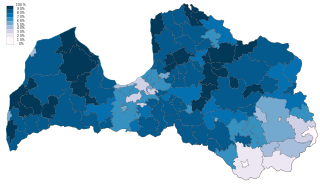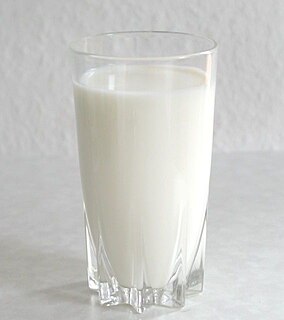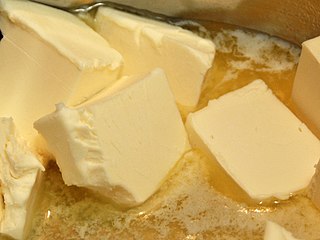
The Balts or Baltic people are an Indo-European ethno-linguistic group who speak the Baltic languages, a branch of the Indo-European language family, originally spoken by tribes of central Eastern Europe in the west to the Moscow, Oka and Volga river basins in the east. The Baltic languages form a part of the wider group of Balto-Slavic languages.

The foreign relations of Latvia are the primary responsibility of the Ministry of Foreign Affairs. Today's Republic of Latvia regards itself as a continuation of the 1918–1940 republic. After the declaration on the restoration of its full independence on August 21, 1991, Latvia became a member of the United Nations on September 17, 1991, and is a signatory to a number of UN organizations and other international agreements. Latvia welcomes further cooperation and integration with NATO, European Union, OECD and other Western organizations. It also seeks more active participation in UN peacekeeping efforts worldwide.

Mozzarella is a traditionally southern Italian cheese made from Italian buffalo's milk by the pasta filata method. Mozzarella received a Traditional Specialities Guaranteed (TEG) certification from the European Union in 1998. This protection scheme requires that mozzarella sold in the European Union is produced according to a traditional recipe.
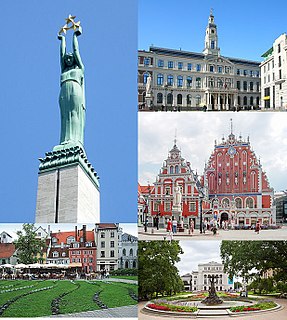
Riga is the capital of Latvia and is home to 632,614 inhabitants (2019), which is a third of Latvia's population. Being significantly larger than other cities of Latvia, Riga is the country's primate city. It is also the largest city in the three Baltic states and is home to one tenth of the three Baltic states' combined population. The city lies on the Gulf of Riga at the mouth of the Daugava river where it meets the Baltic Sea. Riga's territory covers 307.17 km2 (118.60 sq mi) and lies 1–10 m above sea level, on a flat and sandy plain.

The Baltic states, also known as the Baltic countries, Baltic republics, Baltic nations or simply the Baltics, is a geopolitical term, typically used to group the three sovereign states in Northern Europe on the eastern coast of the Baltic Sea: Estonia, Latvia, and Lithuania. The term is not used in the context of cultural areas, national identity, or language, because while the majority of people in Latvia and Lithuania are Baltic people, the majority in Estonia are Finnic. The three countries do not form an official union, but engage in intergovernmental and parliamentary cooperation. The most important areas of cooperation between the three countries are foreign and security policy, defence, energy and transportation.
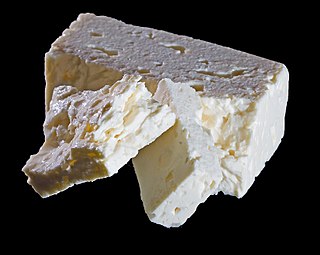
Feta is a brined curd white cheese made in Greece from sheep's milk or from a mixture of sheep and goat's milk. It is a crumbly aged cheese, commonly produced in blocks, and has a slightly grainy texture. Feta is used as a table cheese, as well as in salads and pastries. Most notable is its use in the popular phyllo-based dishes spanakopita and tyropita, or served with some olive oil or olives and sprinkled with aromatic herbs such as oregano. It can also be served cooked or grilled, as part of a sandwich, in omelettes, or as a salty alternative to other cheeses in a variety of dishes.
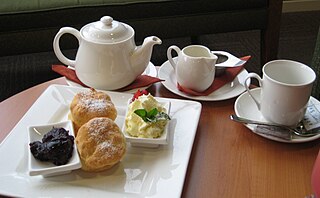
A cream tea is a form of afternoon tea light meal, consisting of tea taken with a combination of scones, clotted cream, and jam. Traditionally a speciality of Devon and Cornwall, cream teas are offered for sale in tea rooms in those two counties, as well as in other parts of England, and elsewhere in the Commonwealth.
Three European Union schemes of geographical indications and traditional specialties, known as protected designation of origin (PDO), protected geographical indication (PGI), and traditional specialities guaranteed (TSG), promote and protect names of quality agricultural products and foodstuffs. Products registered under one of the three schemes may be marked with the logo for that scheme to help identify those products. The schemes are based on the legal framework provided by the EU Regulation No 1151/2012 of the European Parliament and of the Council of 21 November 2012 on quality schemes for agricultural products and foodstuffs. This regulation ensures that only products genuinely originating in that region are allowed to be identified as such in commerce. The legislation first came into force in 1992. The purpose of the law is to protect the reputation of the regional foods, promote rural and agricultural activity, help producers obtain a premium price for their authentic products, and eliminate the unfair competition and misleading of consumers by non-genuine products, which may be of inferior quality or of different flavour.

The following four classifications of wine constitute the Italian system of labelling and legally protecting Italian wine:

Bryndza is product of a sheep milk cheese made mainly in Slovakia, Romania, Moldova and Serbia, but also in Poland, Ukraine, Hungary and part of Moravia in Czech Republic. Bryndza cheese is creamy white in appearance, known for its characteristic strong smell and taste. The cheese is white, tangy, crumbly and slightly moist. It has characteristic odor and flavor with a notable taste of butyric acid. The overall flavor sensation begins slightly mild, then goes strong and finally fades to a salty finish. Recipes differ slightly across countries.
Latvian cuisine typically consists of agricultural products, with meat featuring in most main meal dishes. Fish is commonly consumed due to Latvia's location on the east coast of the Baltic Sea.

Jonas Mačiulis is a Lithuanian professional basketball player for AEK Athens of the Greek League. Standing at 1.98 m, he plays at the small forward position. As a member of the senior Lithuanian national team, he earned an All-EuroBasket Team selection in 2015, as Lithunania won the silver medal.
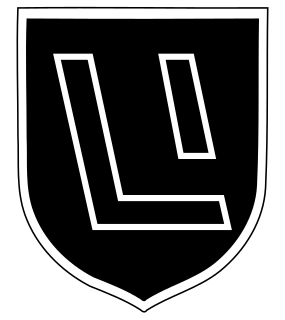
The 15th Waffen Grenadier Division of the SS , Latvian: 15. ieroču SS grenadieru divīzija ) was an Infantry Division of the Waffen-SS during World War II. It was formed in February 1943, and together with its sister unit, the 19th Waffen Grenadier Division of the SS formed the Latvian Legion.
The denominação de origem controlada is the system of protected designation of origin for wines, cheeses, butters, and other agricultural products from Portugal.

Bremer Klaben, or just Klaben, is a type of Stollen from Bremen, Germany. This celebrated bread is famous in Northern Germany that gained its fame as it is traditionally eaten during the Christmas season. It is said that Bremer Klaben tastes especially good when it is baked two weeks before serving. The shelf life of this pastry is for several months.
Prodotto agroalimentare tradizionale (PAT), is an official approval for traditional Italian regional food products similar to the Protected Geographical Status of the European Union. A list of approved products is published by the Ministry of Agricultural, Food and Forestry Policies. It lists only products that do not qualify for pan-European approval, and as such PAT is only applicable within Italy.
Since 2010 the Greek national football team has twice taken part in the UEFA European Championships: it reached the quarterfinals in 2012 but failed to qualify in 2016. The team also reached the group stage in the 2010 World Cup, the Round of 16 in the 2014 World Cup and in 2017 played in Group H of the qualifying stage for the 2018 World Cup.
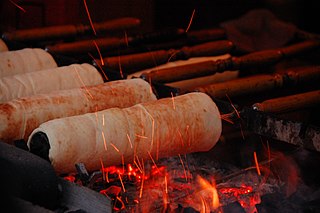
A spit cake is a European cake made with layers of dough or batter deposited, one at a time, onto a tapered cylindrical rotating spit. The dough is baked by an open fire or a special oven, rotisserie-style. Generally, spit cakes are associated with celebrations such as weddings and Christmas. The spit can be dipped in a thin dough, or the dough can be poured or rolled on the spit. This cake group may have originated from Ancient Greek times, around 400 BC, when similar large cakes were prepared on spits for Dionysiac feasts.
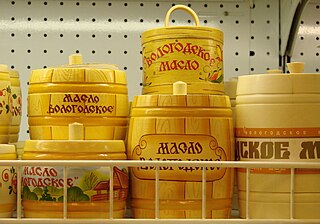
Vologda butter, or Vologodskoye Maslo, formerly known as Parisian butter, is a type of butter made in the Vologda region of Russia, known for its sweet, creamy and nutty flavor. It gets its flavor from its particular manufacturing process, which involves an exact set of temperatures and fat content; as well as due to the vegetation and breed of cows found in Vologda.
